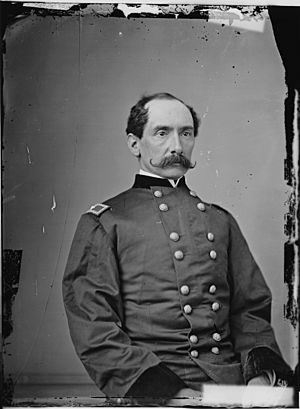Edward E. Potter facts for kids
Quick facts for kids
Edward Elmer Potter
|
|
|---|---|
 |
|
| Born | June 21, 1823 New York City, New York |
| Died | June 1, 1889 (aged 65) New York City, New York |
| Place of burial |
New York City Marble Cemetery, New York City, New York
|
| Allegiance | United States |
| Service/ |
United States Army |
| Years of service | 1862 – 1865 |
| Rank | |
| Unit | 1st North Carolina Infantry Regiment |
| Battles/wars | American Civil War |
| Other work | farmer |
Edward Elmer Potter was an important officer in the Union Army during the American Civil War. He is best known for his work in North Carolina throughout the war.
Contents
Early Life and Joining the War
Edward Elmer Potter was born in New York City on June 21, 1823. He went to college at Columbia College. After finishing school, he traveled to California in 1849. This was during the exciting time of the California Gold Rush, when many people went west hoping to find gold.
When he returned to New York, Potter became a farmer. But his life changed when the Civil War began in 1861.
Military Service in North Carolina
In February 1862, Edward Potter joined the Union Army. He became a captain in the supply department. This department made sure soldiers had food and other important supplies. He worked with a group led by General John G. Foster.
Potter was part of a big mission called Burnside's North Carolina Expedition. This mission helped the Union Army take control of parts of the North Carolina coast. After the Union Army took over, Potter was allowed to create a new army unit. This unit was called the 1st North Carolina Infantry. It was made up of people from around Washington, North Carolina who supported the Union.
Potter quickly moved up in rank. On October 1, 1862, he became a lieutenant colonel. Soon after, on November 29, 1862, he was promoted to brigadier general. This was a very high rank for a volunteer officer.
Defending Washington and Other Commands
When General John G. Foster took charge of the 18th Army Corps, General Potter became his chief of staff. This meant Potter was Foster's main helper and advisor.
During the siege of Washington, the city was surrounded by Confederate forces. General Foster went to Washington to lead the defense himself, and Potter was with him. When it became hard to get help into the city, Foster decided to leave and bring in more troops. He left General Potter in charge of defending Washington. Potter did a great job, and the Confederates eventually had to leave.
After this, Potter was put in charge of defending the cities of Norfolk and Portsmouth. Later, he again became chief of staff for General Foster. This was when Foster was given command of the Army of the Ohio. Potter's time in Tennessee was short. Four months later, he returned to the Atlantic coast. He was put in charge of the area around Hilton Head, South Carolina.
Later Actions and Promotions
In November 1864, General Potter led his soldiers into battle at the Battle of Honey Hill. In 1865, he organized raids into the inner parts of South Carolina and North Carolina. These raids helped the Union cause.
On March 13, 1865, Potter received another special promotion. He was given the honorary rank of major general. This was a "brevet" promotion, meaning it was a reward for his bravery and leadership.
After the war, Edward Elmer Potter returned to his life as a farmer. He passed away on June 1, 1889, in New York City.
 | Shirley Ann Jackson |
 | Garett Morgan |
 | J. Ernest Wilkins Jr. |
 | Elijah McCoy |

